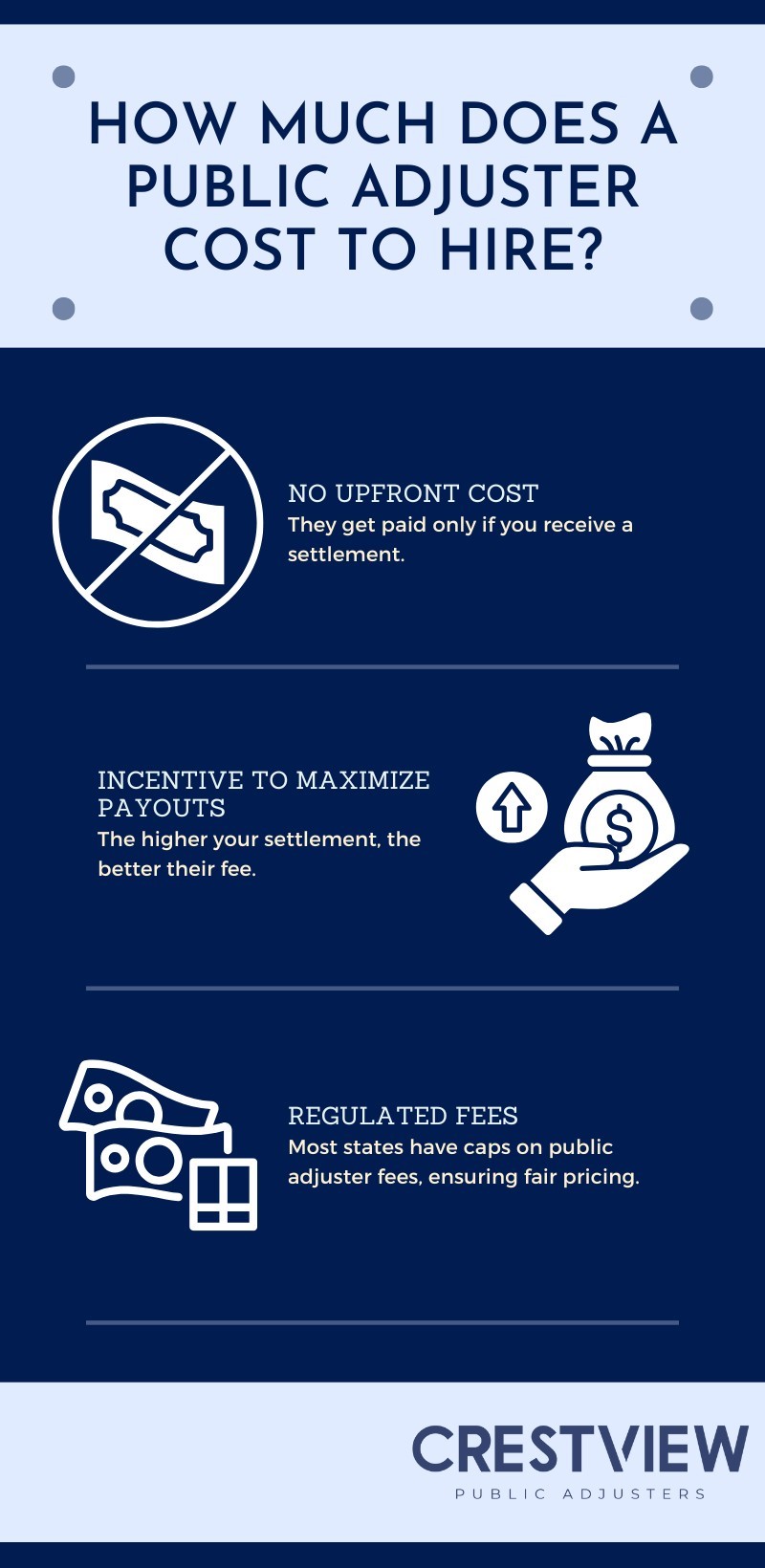Key Points:
- Public adjusters work for policyholders, while insurance adjusters represent the insurance company.
- Public adjusters negotiate for maximum payouts, while insurance adjusters aim to minimize claims for the insurer.
- Hiring a public adjuster can be beneficial for complex or denied claims, especially in New York, New Jersey, and Florida.
Filing an insurance claim means you’ll interact with an insurance adjuster, but you also have the option to hire a public adjuster. The key difference is who they work for. An insurance adjuster represents the insurance company, while a public adjuster represents you, the policyholder. This distinction plays a crucial role in how claims are handled, negotiated, and ultimately settled.
Understanding these differences can help policyholders make informed decisions when dealing with property damage, business losses, or other insurance claims. Below, we break down the roles, responsibilities, and benefits of both types of adjusters to help you navigate the claims process effectively.
What Does an Insurance Adjuster Do?
An insurance adjuster, sometimes called a company adjuster, works for the insurance provider. Their primary responsibility is to assess the damage and determine the payout the insurer should offer—but within limits that benefit the company.
Key Responsibilities of an Insurance Adjuster:
- Inspect the Damage – They assess the extent of loss for properties, vehicles, businesses, or other insured items.
- Verify Policy Coverage – They determine what aspects of the loss are covered under the policy terms.
- Estimate Repair Costs – They calculate a payout based on repair estimates, depreciation, and policy limits.
- Negotiate Payouts – They negotiate settlements but typically lean toward the lowest possible payout to save the insurer money.
Potential Drawbacks of an Insurance Adjuster for Policyholders
While insurance adjusters are skilled at evaluating claims, they work for the insurance company, not you. This can sometimes result in:
- Lower payouts than the actual cost of repairs.
- Delayed processing due to insurer bureaucracy.
- Denied claims for technicalities or ambiguous policy interpretations.
What Does a Public Adjuster Do?
A public adjuster is a licensed professional who works exclusively for policyholders, not insurance companies. Their role is to maximize your claim payout by ensuring the damage is fully documented and fairly evaluated.
Key Responsibilities of a Public Adjuster:
- Conduct Independent Damage Assessments – Unlike insurance adjusters, public adjusters perform their own evaluations to ensure nothing is overlooked.
- Review Policy Details – They analyze policy language to identify all possible coverages you can claim.
- Negotiate Directly with the Insurance Company – They act as your advocate, fighting for the highest possible settlement.
- Handle Complex Claims – If your claim is denied, delayed, or undervalued, a public adjuster can step in and challenge the decision.
Why Should You Hire a Public Adjuster?
Many policyholders don’t realize they have the right to an independent adjuster. A public adjuster can significantly increase claim payouts, especially in cases of:
- Severe property damage (fire, flood, storm, mold, etc.).
- Business interruption losses that require extensive documentation.
- Denied or underpaid claims where insurers lowball the settlement.
Studies show that policyholders who use public adjusters receive significantly higher settlements than those who rely on insurance adjusters alone.

When Should You Hire a Public Adjuster?
If your claim is straightforward and the payout meets expectations, you might not need a public adjuster. However, in many cases, hiring one is beneficial.
Signs You Need a Public Adjuster:
- The insurance company’s offer seems too low. Public adjusters analyze whether the offer is fair compared to actual repair costs.
- Your claim is complex. Large-scale property losses or business interruption claims often require specialized knowledge to ensure maximum compensation.
- Your claim has been denied or delayed. Public adjusters can appeal denials and push for a timely resolution.
- You don’t have time to deal with the insurance process. They handle all paperwork, negotiations, and follow-ups, so you don’t have to.
Public Adjuster vs Insurance Adjuster: Which One Should You Trust?
Both types of adjusters assess damage and determine claim payouts, but their loyalty lies with different parties:
Factor: Who They Work For
- Insurance Adjuster: Insurance Company
- Public Adjuster: Policyholder
Factor:Goal
- Insurance Adjuster: Minimize claim payouts
- Public Adjuster: Maximize claim payouts
Factor: Fee Structure
- Insurance Adjuster: No cost to policyholder
- Public Adjuster: Percentage of claim payout
Factor: Negotiation Role
- Insurance Adjuster: Represents the insurer’s interests
- Public Adjuster: Represents the policyholder’s interests
Factor: Best For
- Insurance Adjuster: Simple claims with fair offers
- Public Adjuster: Complex, denied, or underpaid claims
If you’re facing a significant loss, a public adjuster is often the better choice, as they work to ensure you receive the full compensation you’re entitled to.
How Much Does a Public Adjuster Cost?
Unlike insurance adjusters, who are salaried employees of the insurer, public adjusters are paid a percentage of the final claim settlement—typically between 5% and 20%, depending on the complexity of the claim.

For many policyholders, this fee structure is worth it, as public adjusters often secure much higher settlements than what insurers initially offer.
Get the Claim Settlement You Deserve – Work with a Public Adjuster
Dealing with property damage or business losses, don’t settle for the first offer from an insurance company. A public adjuster ensures you receive every dollar you’re entitled to.
At Crestview, we specialize in helping policyholders in New Jersey, New York, and Florida fight for fair and full settlements. Whether your claim is delayed, denied, or undervalued, our team is here to handle the process, negotiate aggressively, and secure the highest payout possible.
Don’t leave money on the table. Contact Crestview today for a free claim evaluation!

